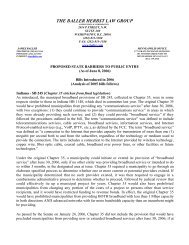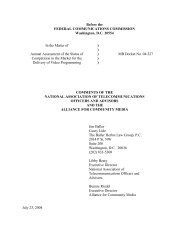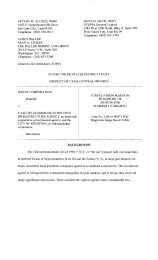Petition for Writ of Certiorari
Petition for Writ of Certiorari
Petition for Writ of Certiorari
You also want an ePaper? Increase the reach of your titles
YUMPU automatically turns print PDFs into web optimized ePapers that Google loves.
11<br />
regulation or legal requirement otherwise impermissible under subsection (a) does not satisfy the requirements <strong>of</strong><br />
subsection (b), we must preempt the en<strong>for</strong>cement <strong>of</strong> the requirement “to the extent necessary to correct the<br />
violation” in accordance with section 253(d). This is the approach that the Commission has taken in prior orders<br />
addressing section 253.<br />
4. On August 28, 1997, the General Assembly <strong>of</strong> Missouri enacted HB 620, which replaced certain<br />
provisions <strong>of</strong> Missouri’s telecommunications statute regarding the issuance <strong>of</strong> certificates <strong>of</strong> public convenience and<br />
necessity <strong>for</strong> the provision <strong>of</strong> telecommunications service. With certain limited exceptions, it prohibits political<br />
subdivisions from obtaining a certificate <strong>of</strong> service authority to provide telecommunications services or facilities.<br />
The statute states: No political subdivision <strong>of</strong> this state shall provide or <strong>of</strong>fer <strong>for</strong> sale, either to the public or to a<br />
telecommunications provider, a telecommunications service or telecommunications facility used to provide a<br />
telecommunications service <strong>for</strong> which a certificate <strong>of</strong> service authority is required pursuant to this section. Nothing<br />
in this subsection shall be construed to restrict a political subdivision from allowing the nondiscriminatory use <strong>of</strong> its<br />
rights_<strong>of</strong>_way including its poles, conduits, ducts and similar support structures by telecommunications providers or<br />
from providing telecommunications services or facilities:<br />
(1) For its own use;<br />
(2) For 911, E_911 or other emergency services;<br />
(3) For medical or educational purposes;<br />
(4) To students by an educational institution;<br />
(5) Or Internet type services.<br />
The provisions <strong>of</strong> this subsection shall expire on August 28, 2002.<br />
5. HB 620 is similar to a Texas statute that the Commission declined to preempt. In the Texas<br />
Preemption Order, the Commission found that a provision <strong>of</strong> the Texas Public Utility Regulatory Act <strong>of</strong> 1995<br />
(“PURA95") that prohibited municipalities from providing telecommunications services did not violate section<br />
253(a). Ruling on a petition <strong>for</strong> preemption <strong>of</strong> section 3.251(d) <strong>of</strong> PURA95 filed by the City <strong>of</strong> Abilene, Texas, the<br />
Commission stated that the City <strong>of</strong> Abilene was not an “entity” separate and apart from the state <strong>of</strong> Texas <strong>for</strong> the<br />
purpose <strong>of</strong> applying section 253(a) <strong>of</strong> the Act. It found that preempting the en<strong>for</strong>cement <strong>of</strong> the Texas statute would<br />
insert the Commission “into the relationship between the state <strong>of</strong> Texas and its political subdivisions in a manner<br />
that was not intended by section 253.” The Commission reasoned that Texas retains substantial sovereign power to<br />
decide what activities to authorize its political subdivisions to undertake. With regard to such fundamental state<br />
decisions, the Commission stated that it must adhere to the standard in Gregory v. Ashcr<strong>of</strong>t, in which the Supreme<br />
Court held that a court must not construe a federal statute to preempt traditional state powers unless Congress has<br />
made its intention to do so unmistakably clear in the language <strong>of</strong> the statute.<br />
6. In the Texas Preemption Order, the Commission determined that because section 253(a) is<br />
directed at requirements that “prohibit or have the effect <strong>of</strong> prohibiting the ability <strong>of</strong> any entity” to provide<br />
telecommunications services, it appears to prohibit restrictions on market entry that apply to independent entities<br />
subject to state regulation, not to political subdivisions <strong>of</strong> the state itself. The Commission found that if it construed<br />
the term “entity” in section 253(a) in this context to include municipalities, it would prevent states from prohibiting<br />
their political subdivisions from providing telecommunications services, despite the fact that states could limit the<br />
authority <strong>of</strong> their political subdivisions in all other respects. The Commission did not find a clear indication <strong>of</strong><br />
Congressional intent in section 253 to intervene in this state_local relationship as it affected municipalities, but<br />
expressly declined to address the issue <strong>of</strong> whether section 253 barred the state <strong>of</strong> Texas from prohibiting the<br />
provision <strong>of</strong> telecommunications services by a municipally_owned electric utility.<br />
7. The City <strong>of</strong> Abilene sought judicial review <strong>of</strong> the Texas Preemption Order be<strong>for</strong>e the Federal<br />
Court <strong>of</strong> Appeals <strong>for</strong> the D.C. Circuit. The D.C. Circuit upheld the Commission’s interpretation <strong>of</strong> Section 253.<br />
Citing Gregory, the court held that the text <strong>of</strong> section 253 is not sufficiently clear to find that Congress intended in






